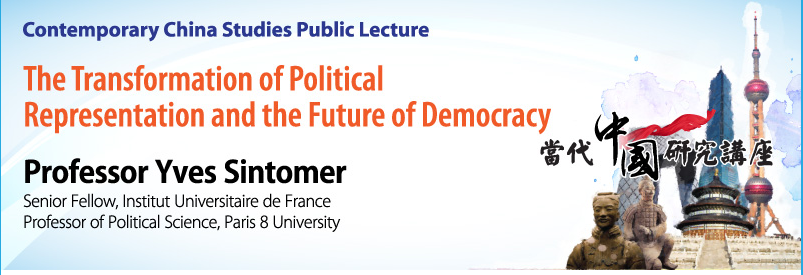Organizers:
The Faculty of Social Sciences, University of Hong Kong (HKU) &
The French Centre for Research on Contemporary China (CEFC)
Speaker: Prof. Yves Sintomer

Introduction:
Democracy is presently a popular ideal in many countries which do not have such a political regime, but political distrust is growing in the old democracies. How can this paradox be understood? One interesting path is to analyze the transformation of political representation that is taking place worldwide. The lecture will first analyze the meanings of political representation, departing from mainstream Anglo-American political science. It will pay attention to the contrasting translations of the English word “representation” in other languages – the Chinese 代表 (dàibiǎo) expressing for example just one dimension of the English “representation”. The lecture will insist on a dichotomy between the (mostly electoral) mandated representation and embodiment- (体现 ti xian) grounded representation, an old European concept that conceives the representative as embodying the represented. Such a concept could help to better understand both Western (for example the famous words “We, the people” of the adoption of the US constitution) and Chinese (especially the “Three Represents” 三个代表 sāngè dàibiǎo) representative claims. Relying on this analysis, the second part of the lecture will stress the diversity of representative claims, provincializing the classical model of West-European and North-American representative government. It will present alternative scenarios for the future of political representation in the Global north, but also in a more global perspective, the most realistic scenarios between those of post-democracy, authoritarianism and the democratization of democracy.
Prof. Yves Sintomer is Senior fellow at the Institut Universitaire de France, one of the most prestigious academic institutions in France, and professor of political science at the University of Paris-VIII. He received his PhD in political and social sciences from the European University Institute in Florence, and his a Habilitation for PhD supervision at the University of Paris-V. He is an associate faculty at Sciences Po Paris, the Universidad del Pais Vasco (Spain), Neuchâtel and Lausanne Universities (Switzerland), and the Marc Bloch Centre (Humboldt University Berlin/CNRS). His main research topics include participatory and deliberative democracy; French and German political sociology; the history and contemporary transformation of political representation; and a global comparison of politics in France, Germany, Brazil, India and China. He is author of Participatory Budgeting in Europe; Democracy and Public Governance (with C. Herzberg and A. Röcke), Ashgate, London (in press); Deliberation: values, processes, institutions (with S. Coleman and A. Przybylska), Peter Lang, Varsaw, 2016; Local participation in Southern Europe: Causes, Characteristics and Consequences (with J. Font and D. della Porta), Rowman & Littlefield, Washington D.C., 2014; Participatory Budgeting in Asia and Europe. Key Challenges of Participation (with R. Traub-Merz and J. Zhang), Palgrave, Houndmills, Basingstoke/New York, 2013; Participatory Budgeting Worldwide (with C. Herzberg and G. Allegretti), Engagement Global, Bonn, 2013; The Porto Alegre Experiment: Learning Lessons for a Better Democracy, Zed Books, New York, 2004; Petite histoire de l’expérimentation démocratique. Tirage au sort et politique d’Athènes à nos jours, La Découverte, Paris, 2011; La démocratie impossible? Politique et modernité chez Weber et Habermas, La Découverte, Paris, 1999. He is also presently editing a new French translation of Max Weber’s Economy and society. His writings have been published in 18 languages.
Prof. John Burns, Dean of Faculty of Social Sciences, HKU, will chair the seminar.
This seminar will be held in English.

